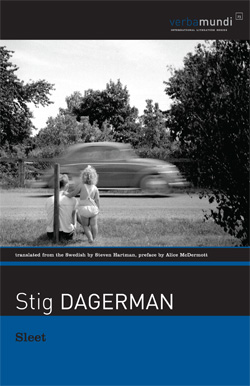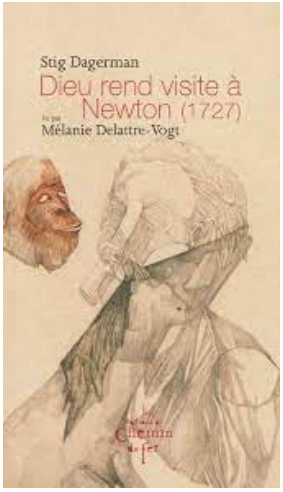STIG DAGERMAN (1923-1954), Swedish writer and journalist, broke onto the literary scene at twenty-two. He enjoyed phenomenal success publishing four very different novels, a unique travel book from Germany in 1946, short stories – one of which became an instant classic – as well as essays, poetry, and plays. He was a prolific commentator on current events through satirical verse. Then, suddenly, he fell silent. In 1954, Sweden was stunned to learn that Stig Dagerman, the epitome of his generation of writers, had been found dead in his car. Read more

GERMAN AUTUMN
Dagerman describes all of it with a ferocious lucidity that does not admit hyperbole or sentimentality. He is concerned to tell the truth, to show the world as it is because only then can a clear idea be formed of what ought to happen next.
—Aaron Thier, The New Republic
German Autumn is one of the best collections ever written about the aftermath of war.
–Henning Mankell for the US edition

SLEET and Other Short Stories
Dagerman knows how to use silence, stillness, the half-said, the understated in order to dramatize states of deep raw feeling … Short days, cold air, the nervous glance, the glimpse, the night without sleep, are the bricks with which he builds his fictional houses filled with shadows and unresolved pain, but filled also with a stark tenderness, at times a grim humor, in the face of uneasiness and loss.
–Colm Tóibín, The New York Review of Books

A MOTH TO A FLAME
Dagerman is excellent on how our motives can be a mystery even to ourselves … this searing tale of bereavement and loathing feels all too relevant today.
A startling novel of ferocious psychological acumen …. A book for our times.
—Siri Hustvedt, preface to Penguin UK edition
Dagerman wrote with beautiful objectivity. Instead of emotive phrases, he uses a choice of facts, like bricks, to construct an emotion. —Graham Greene, cover of U.S. edition of The Games of Night, 1961

OUR NEED FOR CONSOLATION IS INSATIABLE
… a friend of mine lent me the book and it just hit me instantly. I believe there are moments when certain things need to be heard and I felt Dagerman’s text, which he wrote back in 1952, is just so topical now. The way I read it, his text is an anthem to freedom.
–Christian Olivier, singer in Têtes Raides
Stellan Skarsgård in Our Need for Consolation

WEDDING WORRIES
Wedding Worries is an incredible book … the most Faulknerian book that I’ve read in years … There’s so much to like here, so much giggling and joy amid the pure run-down, dissolute, messed-up set of characters and desires … I urge you to stock it, buy it, read it, recommend it.
— Chad Post, Three Percent Blog

THE SNAKE
Dagerman’s novel is a cry for individual responsibility and freedom, as well as a spirited work of resistance to the conventions of bourgeois life, which restrain and stupefy people. And it is a call for free thought and speech to clarify what should be done.
–Siri Hustvedt, Living, Thinking, Looking

A THOUSAND YEARS WITH GOD
If the novel about Almqvist had been completed and the power, that characterizes its first chapter, had been sustained, it would have become Stig Dagerman’s finest oeuvre.
–Olof Lagercrantz, Stig Dagerman, quote translated from the Swedish by Lo Dagerman

ISLAND OF THE DOOMED
All of Dagerman’s oeuvre, his novels, poems and political essays are in some way contained in this stormy novel, in its whirl of sensations and images … With humble gratitude to Stig Dagerman who, in order to show us the way, let himself be consumed by his own fire.
–JMG Le Clézio, Nobel laureate, preface to US edition

DAGERMANS DAILY DOSES
Legendary Swedish troubadour Fred Åkerström sings texts by Joe Hill and Stig Dagerman on his album “Dagsedlar åt kapitalismen” mocking capitalism.

BIRGITTA SUITE AND OTHER POEMS
Never in my wildest dreams did I see myself translating Stig Dagerman’s magnificent “Birgitta Suite,” with its universal themes of love and loss and heartache. My knowledge of Swedish is quite limited, but with Stig Dagerman’s daughter guiding the way, I was able to draw on my poetic sensibilities to help bring the music of this capstone poem to an English-speaking audience.
An imagination that appeals to ‘an unreasonable degree of sympathy’ is precisely what makes Dagerman’s fiction so evocative. Evocative not, as one might expect, of despair, or bleakness, or existential angst, but of compassion, fellow-feeling, even love. — Alice McDermott, preface to SLEET


